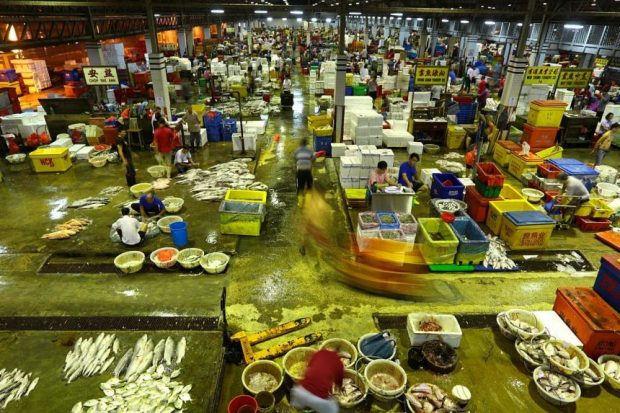
Covid-19 upsurge derails Singapore’s normality push

By Ivan Lim
Former AJA President, Contributor to AsiaN
SINGAPORE: Just when things seemed to be looking up, a sudden surge in Covid-19 cases has pushed Singapore off course from the government’s much-heralded plan to move into an endemic phase of living with the presence of the virus as a form of perennial influenza.
As daily cases passed the century mark, fuelled by outbreaks in popular KTV lounges and the bustling Jurong Fishery Port, the authorities announced a return to a semi-lockdown mode on July 19 just ahead of planned National Day celebrations, with curbs extended from July 22 to Aug 21.
There was no other option as risks were too high of the Jurong Fishery Port cluster spilling over to the wider community – since the wholesale live seafood market is connected to wet markets and food centres across the city-state.
Harking back to the Heightened Alert (HA) phase 2 (May 16-June13), the tighter restrictions ruled out dining at open-air hawker centres, air-conditioned food courts as well as at restaurants; home visits were capped at two people and work from home was made the default rule.
At the same time, a painful decision was made to postpone the nation’s 56thbirthday parade by 12 days to Aug 21. To be sure, a ceremony will be held on Aug 9 on a floating platform at Marina Bay.
To the nation-state’s achievement-oriented leaders the celebrations were to mark a milestone in the 18-month-long battle with the Covid-19 pandemic by having two-thirds of its population inoculated with the Pfizer BioNTech vaccines to bring about herd immunity. This would have paved the way for the financial hub to transit into a new normalcy.
However, while close to 50 per cent of the population have completed their vaccination regimen, a huge bloc of 200,000 seniors aged 60 to 70 has yet to get their jabs. They are seen as most vulnerable to the highly contagious Delta variant of the virus; it was feared they could fall seriously ill, requiring hospital treatment.
The past week has seen 1,000 new cases as the Jurong Fishery Port cluster spread to a dozen wet markets and food centres.
Not wanting to see health services overwhelmed, the Ministerial Covid-19 Taskforce (MTF) is ramping up efforts to cajole the elderly to be vaccinated. They have been hesitant to take the vaccine for fear of severe side effects and complications.
Weighing in, Prime Minister Lee Hsien Loong, 69, made a special appeal to the elderly on Facebook yesterday:” Don’t worry, it’s very safe. The vaccine will protect you from Covid-19.”
Earlier, Mr Lee noted that Singaporeans were disappointed by this step back (Heightened Alert-2). But sounding upbeat, he said that in a few weeks, “if all goes well, our vaccination coverage should be much higher and we should be able to relax our measures; we are not new normal yet but steadily getting there.”
According to Health Minister Ong Ye Kung, Singapore would be safe from Covid-19 if at least 70 or 80 per cent or more of its population of 5.7 million, including the elderly, are vaccinated.
Looking back, the MTF has followed a combination of movement curbs, screening tests, contact tracing and quarantine that had proved effective in checking an explosive Changi Airport and Tan Tock Seng Hospital virus outbreaks in May.
As local infection figures came down then, social gatherings were rolled back to allow for dining out and household visits, though capped at two, bringing much relief to residents and businesses.
There was at the time a glimmer of light at the end of the tunnel till things took a turn for the worse.
Out of the blue, on July 12, came reports of night-life revellers falling sick after visiting KTV lounges. The outbreak quickly emerged as an explosive Covid-19cluster.
This was a blow to the authorities as they had given KTV establishments a life-line at the height of pandemic in October to operate as food and beverage outlets.
Instead, some of the outlets masqueraded as bistros complete with services of hostesses from Vietnam, Thailand and South Korea. The irresponsible move triggered a hotbed for virus super-spreaders.
The authorities, reverting swiftly to a fire-fighting mode, suspended the rogue KTV lounges and ordered Covid-19 tests for the operators, staff and patrons. The virus had spread and, by July 19, cases had risen to 193 and then to 207 on July 21.
Compounding the woes, infections popped up at the Jurong Fishery Port, which hosts a wholesale market for live seafood from Thailand, Malaysia and Indonesia. Buzzing with fish merchants and buyers, as well as delivery workers, from 1 am to 4 am daily, the port supplies fish to wet markets and food centres across the island.
To pre-empt a spill-over from the port to the community markets and food joints, the authorities suspended the wholesale market and sent700 workers and delivery drivers for virus tests and isolation.
Next, to safeguard people going to buy fresh seafood, the markets were condoned off. People were required to check in with contact tracing apps or tokens to get inside.
In spite of the various levels of ring-fencing, 130 locally transmitted cases were reported on July 24, of which 78 were linked to the Jurong Fishery Port cluster and six to the KTV cluster. On July 25, the corresponding figures were 117, 46 and five. The worrisome scenario underpinned the off-and-on heightened social clampdown and revised National Day plans.


